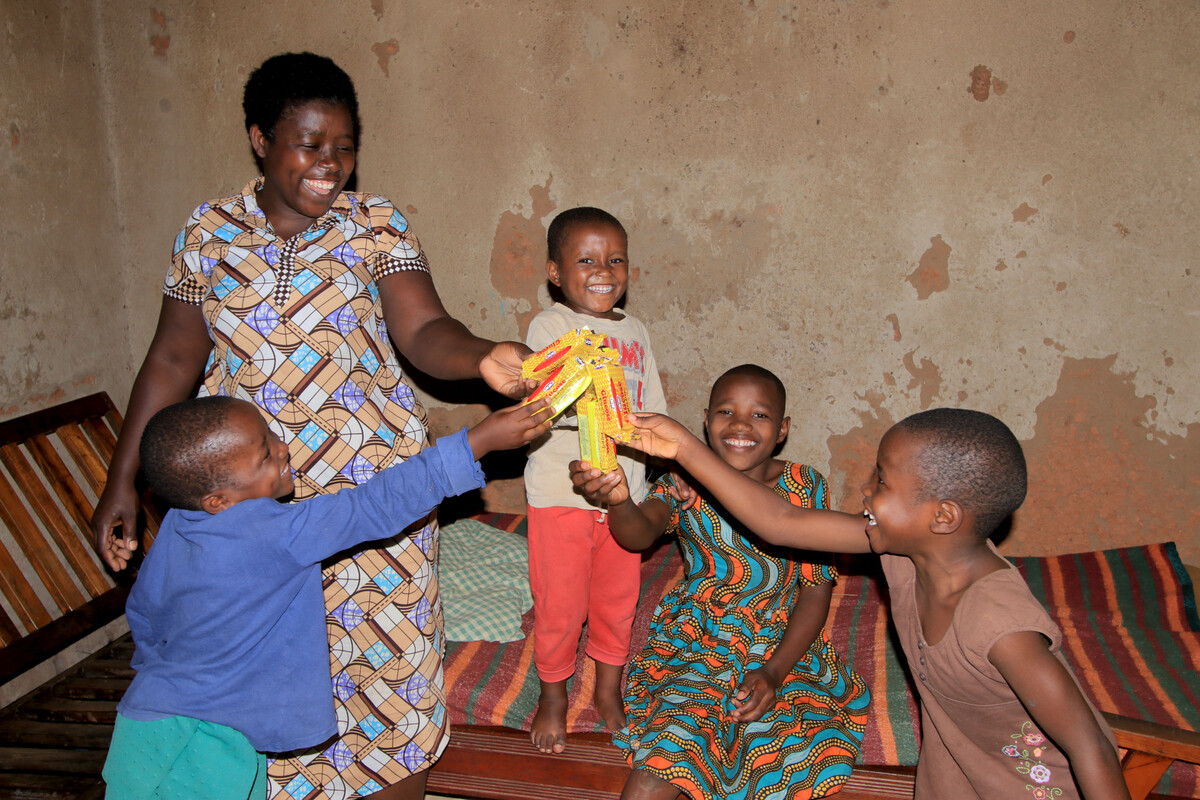Rwanda
Richard Munyaneza, Communications and Advocacy Coordinator, Hope and Homes for Children, Rwanda.
When the pandemic started, everyone was afraid. One of our colleagues said, “There were families whose cases were about to be closed but due to COVID, have lost their economic status, and now they are kept under Hope and Homes for Children regular support.
Adapting to new ways of working whilst maintaining the quality of care needed by those we serve during COVID hasn’t always been easy. However, there have been some positive outcomes to this unpredictable pandemic.
No longer able to physically visit families, we intensified our phone calls and engaged actively in community structures, for example Friends of families, Community Health workers and the National Council for Persons with Disabilities committees. This turned out to be an effective way to carry out community monitoring and support the families under our care.
Before COVID, we had to obtain medication for families and children with disabilities and be the point of access for this. Now, due to COVID, we’ve been able to link families with medical facilities for them to access necessary medication directly.
The pandemic also added another layer of credibility to our work in Rwanda. Some families were very surprised to see us on the frontline continuing to support families, even during the worst lockdowns. One parent said:
“I thought that you were going to stop supporting us because of COVID. But seeing you continuing to call on us, provide food, and care for us, strengthened us.”
Even though COVID was very hard for everyone, it’s shown how we can be resilient as an organisation: adapting to the measures put into place to reduce the spread of COVID whilst effectively continuing to implement activities and services to vulnerable families and children.
India
Subhadeep Adhikary, Program Manager – Child Protection, Child in Need Institute (CINI), our partner in India.
As of 20th April 2022, official figures from the Indian Government and World Health Organisation (WHO), show India has the second-highest number of confirmed COVID cases in the world (after the USA) with 43,047,594 reported cases of infection and the third-highest number of COVID deaths (after the USA and Brazil) at 522,006 deaths. The impact on communities, families and children, many of whom were already extremely vulnerable before the pandemic started, has been significant. In our project areas in Jharkhand, we have seen many families plummet further into poverty, children’s physical and mental health negatively affected and an increased risk of children being trafficked and forced into child labour.
Many of our activities with the community were put on hold due to a government directive that restricted face-to-face meetings, community gatherings and supporting child care institutions in their transition. This meant we had to be more innovative in our approach to ensure we could continue supporting the community. We made full use of technology to provide remote support, health information, counselling, and monitoring through Whatsapp groups and other forms of mobile communication. Through our community workers we were able to keep linking families and children to necessary Government support services including health centres, sponsorship schemes and food programs.
We developed a COVID mobile ‘app’ which was rolled-out to all frontline workers in our project areas to identify and register children who were vulnerable to separation either due to losing a parent or falling into a desperate situation. Using this ‘app’ we were able to keep 60 children – who would otherwise have been exposed to trafficking, being institutionalised, or both – safe with a parent or caregiver.
As we emerge from the pandemic we will build on the innovations it has born to strengthen our work in communities.
Nepal
Anju Pun, Country Director, Forget Me Not, our partner in Nepal
On 31 March 2022 Nepal’s COVID count reached 978,4261 . The heavy rains in mid-October in addition to the pandemic impacted the lives of many with job losses and increase in food and fuel prices. To make things worse there is a growing fear of shortages in the coming months. Despite the challenges, we continued to support government’s deinstitutionalisation efforts and provided our support to the most vulnerable and marginalised children and families.
In January, we saw rising COVID cases. This variant caught most of our team members and our children in transitional care. Our 24 team members, 17 children under case management, and 1 parent of reunified children were infected with the Omicron variant. Luckily, everyone has fully recovered and is back to their normal life.
With Hope and Homes for Children’s support, we’re currently managing 74 cases of reunited children living in 16 districts with their families or in familybased alternative care. During the last 6 months (Oct 2021 – Mar 2022), our reintegration team made 102 in-person family monitoring and follow up visits; provided food support to 38 children and their families; made 420 remote phone calls; and provided education support to 52 children to ensure their well-being and safety.
We can see the resilience of children through the eyes of biological sisters Susheli (12) and Sabita (10). Every evening after school, the two light up their room with laughter and giggles, share their day with family, climb trees and huddle together to study. They were rescued from an abusive and illegal orphanage in Kathmandu and were reunited with their elder sister and brother-in-law in December 2020. This successful family re-integration is a beautiful example of what can be achieved when we provide family support and monitoring and join forces with local authorities.
Support children Make a regular donation
Giving regularly significantly helps us to be flexible in a rapidly changing world
